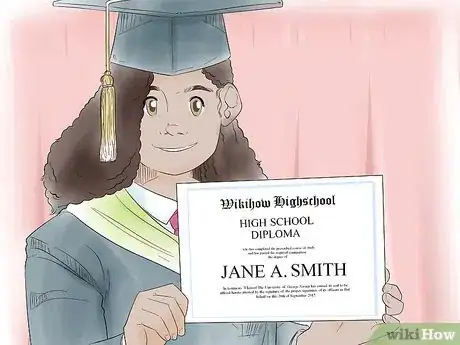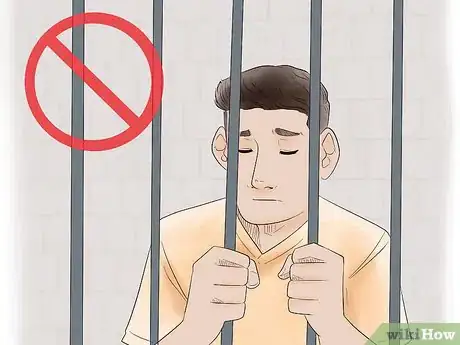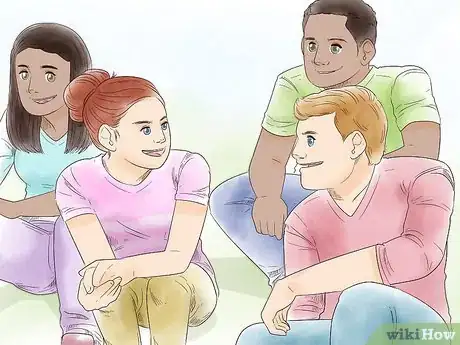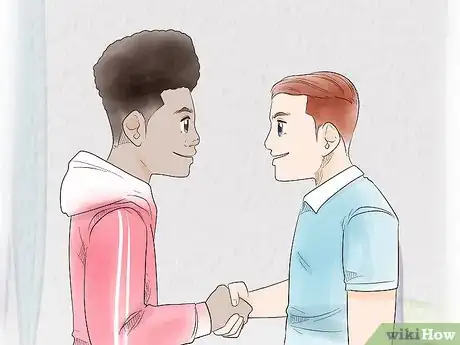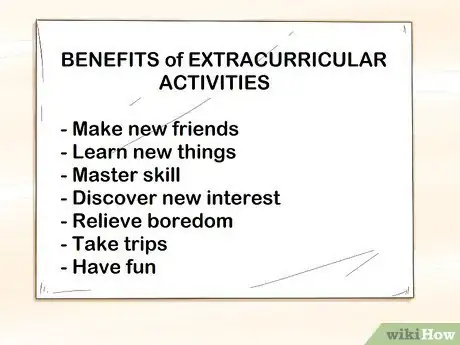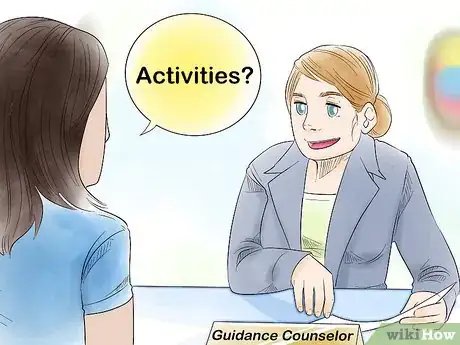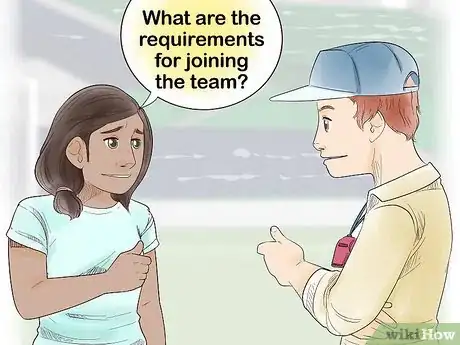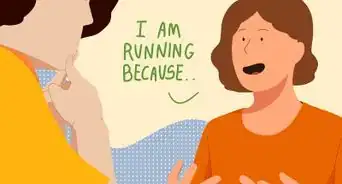This article was co-authored by Desiree Panlilio. Desiree Panlilio is a Teen Life Coach and the Owner of Encouraging Teens, LLC. With over three years of experience, she specializes in helping teens and young adults define roles, set goals, develop healthy academic and personal habits, grow in leadership potential, and create their life paths. Desiree holds a BSN in Nursing from The University of Victoria and an MA in Human Services Counseling with a concentration in Life Coaching from Liberty University.
There are 14 references cited in this article, which can be found at the bottom of the page.
This article has been viewed 62,586 times.
School can often seem like a chore, making it sometimes hard to feel excited about even going. It can also be stressful when things aren’t going well for you at school. Yet there are a number of things that can make going to school worth the effort, and therefore, a more pleasurable experience. This article will discuss some of these things, particularly how graduating will greatly benefit your future, how socializing and making new friends can be an exciting incentive to go to school, and how participating in extracurricular activities can make going to school less boring and much more entertaining.
Steps
Creating a Better Future for Yourself
-
1Increase your ability to get a job. According to the Bureau of Labor Statistics, 12.4% of all people without a high school diploma in 2012 were unemployed compared to 8.3% of those with one. The outlook is worse when examined over a period of time. For instance, between 2000 and 2013, the average unemployment rate for those between the ages of 25-34 who did not complete high school was 15.1%.
- Without a high school diploma, you can’t go to college and going to college is to your advantage.
- For the same time period, the unemployment rate for 25-34 year olds with some college was 8% and only 3.6% for those who graduated from college.[1]
-
2Make much more money in your lifetime. Staying in school will make a huge difference in how much money you make after graduation. Those who don’t finish high school have an average income per year of $20,241 compared to $30,627 for those who did graduate from high school and $56,665 for someone with a college degree.[2] A male high school graduate who works until he’s 65 can expect to earn on average $330,000 more in his life than a dropout, while a male with at least some college will make $538,000 more. The benefits don’t end there.
- Without steady employment or a livable wage, there won’t be opportunities for vacations, let alone nice clothes or cars. In many cases, a car itself might be too expensive and owning a home may never be possible.
Advertisement -
3Avoid a future that includes jail time. Staying in school and graduating greatly reduces the likelihood that you’ll be incarcerated at some point in your life. Almost 1 out of every 10 young males who didn’t finish school was in jail or prison in 2006-07 compared to only 1 out of every 33 high school graduates. And roughly 30% of federal inmates, 40% of state prison inmates, and 50% of people on death row of both genders didn’t complete high school.
-
4Get to know your teachers to advance your prospects. Your teachers can be a great resource to you in a variety of ways if you take the time to reach out to them and get to know them. For instance, if you’re struggling academically, ask for help. Research shows that when students and teachers feel connected, students do better in school and enjoy their classes more.[3] Strengthening your relationships with your teachers will also help you get a job when you graduate; get into college, a graduate program or a trade school; get scholarships to attend those schools; and get valuable insight into other ways to pay for furthering your education.
- They have this knowledge and the very important ability to write letters of recommendation for you, which will be greatly beneficial in achieving your goals.
- You won’t get these things from your teachers, however, if you don’t put in the effort to show them you care about your education.
- If you’re in high school, set up a time to meet with your teachers to talk about your goals and things you’re struggling with. Ask them for help.[4] And help them when you can – stay after class to help pick up things, volunteer if your teacher asks the class for help with something, offer to help hand out assignments or equipment during class and so forth.
- If you’re in college, go to your professors’ office hours on a semi-regular basis. Talk with them and ask questions that show you care about school.
Socializing with Peers
-
1
-
2Make new friends.[8] If you don’t have many friends at school, you are not alone, even if it may seem that way. There are plenty of other students like you who would love to make a new friend as well. The best place to make these new friends is at school. And while it can be nerve-wracking to meet new people, there are things you can do to make it a much more smooth and enjoyable process. Here are some tips to help.
- Be approachable. Many times we unknowingly wear our worries on our faces, and often that’s shown as a scowl. This can make others feel hesitant about talking to you. So make the extra effort to look up instead of at the floor and to smile at others.
- If you don’t know what to talk about with a potential new friend, ask them questions about themselves. People typically love to talk about themselves. Icebreaker questions can be as simple as, “I like your bracelet. Where did you get it?”
- Talk to the new kid at school and invite him or her to eat lunch with you. They’ll probably be very thankful.
- Consider joining an extracurricular activity. Research shows that simply exposing yourself to new people you’re more likely to connect with them. Joining a club or activity that you enjoy will also help you meet like-minded people!
- Being confident helps a lot in making new friends as well. One of the best ways to be more self-confident is to feel good about your appearance. So take a little extra time getting ready in the mornings. You’ll likely find it much easier to smile at others and ask those icebreaker questions when you know you’re looking your best.[9]
-
3Enjoy meaningful conversations. At many schools, you have the opportunity to meet and get to know people from a variety of backgrounds, cultures, religions, etc. You will also meet people with all kinds of quirky interests.[10] Good conversations with new and old friends expand your view on life and make going to school much more fun.
- They also give you a chance to learn things you may not learn elsewhere – about up-and-coming bands, fun events outside of school, and the opposite sex.
- They can also really help when you’re feeling down. One quality conversation can change your outlook pretty fast and make you not feel so alone.
-
4See your boyfriend/girlfriend or crush. Going to school or going back to school means you get to see that special someone in your life more often. This is especially exciting after a long break like summer vacation. If you’re single, school is also a perfect place to safely figure out what most interests you in a romantic partner. It’s also the best place to actually meet someone with those qualities. Where else are there so many members of the opposite sex your age?[11] [12]
-
5Combat teasing. Teasing isn’t a reflection of you and your true self. Nor did you create it. Nonetheless, it’s common in school. And if it’s happening to you, you need to figure out a way to handle it. Much of this will be dependent upon your personality and your readiness to stand up to it. Yet there are ways for all personality types – even if you’re very shy – to fend off teasing. Learning specific ways you can do this will help, even if it takes practice and maybe more time than you’d like. And remember: If the teasing doesn’t stop, if it’s dangerous, if the teaser threatens to hurt you or if the teaser even touches you, you need to talk with an adult (like a teacher) and ask for help. Now, some strategies:
- If you tend to feel hurt easily, totally ignore the teaser, simply shrug and walk away, avoid the teaser as much as possible, give yourself a mental pep talk (“This really bothers me, but I can deal with it.”), visualize a bubble around you and how what’s being said can’t penetrate it or you, and remember you get to choose how you react.
- If you’re ready to confront the teaser, simply say “So?” as you shrug and smile to the teasing remark, leave assertively (“I have better things to do than listen to this!”) and walk away, or make one assertive statement (“Leave me alone.”) and walk away.
- If you’re starting to feel more in control of the teasing, say something that distracts from the teasing (“I hear it’s gonna me a good game tonight.”), make the teaser sound like a broken record and shrug or give a little smile with your statement (“Enough already.”), or state what’s happening as you raise your eyebrows or purse your lips (“You’re kicking my desk.”)
- If you’re pretty confident and quick on your feet, disarm the teaser with humor (a funny one-liner) as you laugh and turn the situation into a funny one and use “I feel” statements (“When you said X, I felt Y. Please stop.")
Participating in Extracurricular Activities
-
1Recognize the benefits of extracurricular activities. Participating in extracurricular activities, and taking leadership roles in them, is something colleges look for and often expect. It can make the difference between being accepted to a school and not. It also increases your chances of getting scholarships and internships. Being involved in them is also attractive to prospective employers. It shows both that you’re responsible and well-rounded.[13]
-
2Find the right activity for you. Choosing extracurricular activities that benefit you in some way will make you enjoy doing them more. Think about your interests, abilities, how much time you can spend on it, skills you want to learn, and what you hope to get out of joining when you select activities. Talk with your guidance counselor or the activities department to see what is offered and how to become involved.[16]
- Guidance counselors will also be able to tell you which activities look best on resumes and applications for colleges and jobs.
- Explore several extracurriculars to see which is the best fit for you. And don’t avoid trying a new one if the first didn’t work out.
- Sometimes a club or activity might not be a good fit because you don’t have enough time. If so, look for something that will work and stick with it.[17]
- The quality of the activity and your level and length of involvement in it matters more to colleges and employers than the quantity of activities you participated in.[18]
-
3Find out if there are requirements for joining. To help you make a decision, you also need to know if there are any specific requirements for joining. You should find out if you have to be a certain age to participate. Ask if there are fees for joining or participating. Determine if you need to have a physical exam and if you need to try-out to join a sport. See if there are minimal time or event requirements. Finally, find out if there is a minimum GPA to join or to continue participation.
- Also ask if there are opportunities to take on a leadership role in the group.
- If there are, think about your strengths and ultimate goals when picking one.[19]
-
4Ask others about how to get involved. Aside from guidance counselors and activities directors, you can also talk to teachers, principals, other administrators, your friends, and members of groups about how to join. They can also give you insight into what’s it really like. Friends or members can be very helpful with this because they’re actually doing it.
- Also check out bulletin boards on campus because clubs and organizations post information there. Write down the website address or contact information if it’s included on the poster or flyer. Then investigate it.[20]
- Consider creating a club or activity that you’re interested in if your school doesn’t offer it. Talk with administrators about getting funding for it.
Expert Q&A
-
QuestionHow can I enjoy going to school?
 Desiree PanlilioDesiree Panlilio is a Teen Life Coach and the Owner of Encouraging Teens, LLC. With over three years of experience, she specializes in helping teens and young adults define roles, set goals, develop healthy academic and personal habits, grow in leadership potential, and create their life paths. Desiree holds a BSN in Nursing from The University of Victoria and an MA in Human Services Counseling with a concentration in Life Coaching from Liberty University.
Desiree PanlilioDesiree Panlilio is a Teen Life Coach and the Owner of Encouraging Teens, LLC. With over three years of experience, she specializes in helping teens and young adults define roles, set goals, develop healthy academic and personal habits, grow in leadership potential, and create their life paths. Desiree holds a BSN in Nursing from The University of Victoria and an MA in Human Services Counseling with a concentration in Life Coaching from Liberty University.
Teen Life Coach Set up a reward system for yourself! Treat yourself to coffee, ice cream, or something else fun if you give 100% effort throughout the school day.
Set up a reward system for yourself! Treat yourself to coffee, ice cream, or something else fun if you give 100% effort throughout the school day. -
QuestionHow can I be positive at school?
 Desiree PanlilioDesiree Panlilio is a Teen Life Coach and the Owner of Encouraging Teens, LLC. With over three years of experience, she specializes in helping teens and young adults define roles, set goals, develop healthy academic and personal habits, grow in leadership potential, and create their life paths. Desiree holds a BSN in Nursing from The University of Victoria and an MA in Human Services Counseling with a concentration in Life Coaching from Liberty University.
Desiree PanlilioDesiree Panlilio is a Teen Life Coach and the Owner of Encouraging Teens, LLC. With over three years of experience, she specializes in helping teens and young adults define roles, set goals, develop healthy academic and personal habits, grow in leadership potential, and create their life paths. Desiree holds a BSN in Nursing from The University of Victoria and an MA in Human Services Counseling with a concentration in Life Coaching from Liberty University.
Teen Life Coach Tell yourself some positive affirmations! Phrases like "I got this," "I can do this," "I am worthy of this," and "I've got it" can make a big difference.
Tell yourself some positive affirmations! Phrases like "I got this," "I can do this," "I am worthy of this," and "I've got it" can make a big difference.
References
- ↑ https://nces.ed.gov/fastfacts/display.asp?id=561
- ↑ http://www.pbs.org/wgbh/pages/frontline/education/dropout-nation/by-the-numbers-dropping-out-of-high-school/
- ↑ http://www.theatlantic.com/education/archive/2014/10/kids-get-better-grades-when-they-share-similarities-with-teachers/381464/
- ↑ Desiree Panlilio. Teen Life Coach. Expert Interview. 12 October 2021.
- ↑ Desiree Panlilio. Teen Life Coach. Expert Interview. 12 October 2021.
- ↑ http://www.socialstudieshelp.com/topics/high-school-2.html
- ↑ http://www.ef.com/blog/language/back-school-5-reasons-get-excited/
- ↑ Desiree Panlilio. Teen Life Coach. Expert Interview. 12 October 2021.
- ↑ http://www.teenvogue.com/advice/school-advice/2014-08/making-new-friends-at-school
- ↑ http://www.hercampus.com/life/campus-living/22-reasons-be-excited-go-back-school
- ↑ http://www.cosmopolitan.com/sex-love/news/a36024/why-you-still-think-about-your-high-school-boyfriend/
- ↑ http://www.popsugar.com/love/Best-Things-About-High-School-24661928?slide=0
- ↑ https://bigfuture.collegeboard.org/get-started/outside-the-classroom/extracurriculars-matter-to-you-and-to-colleges
- ↑ http://www.teenvogue.com/advice/school-advice/2014-08/making-new-friends-at-school
- ↑ http://www.hercampus.com/life/campus-living/22-reasons-be-excited-go-back-school
- ↑ http://teenshealth.org/teen/school_jobs/school/involved_school.html#
- ↑ http://teenshealth.org/teen/school_jobs/school/involved_school.html#
- ↑ http://www.huffingtonpost.com/marjorie-hansen-shaevitz/extra-curricular-activities-college-admission_b_3040217.html
- ↑ http://teenshealth.org/teen/school_jobs/school/involved_school.html#
- ↑ https://bigfuture.collegeboard.org/get-started/outside-the-classroom/extracurriculars-matter-to-you-and-to-colleges
